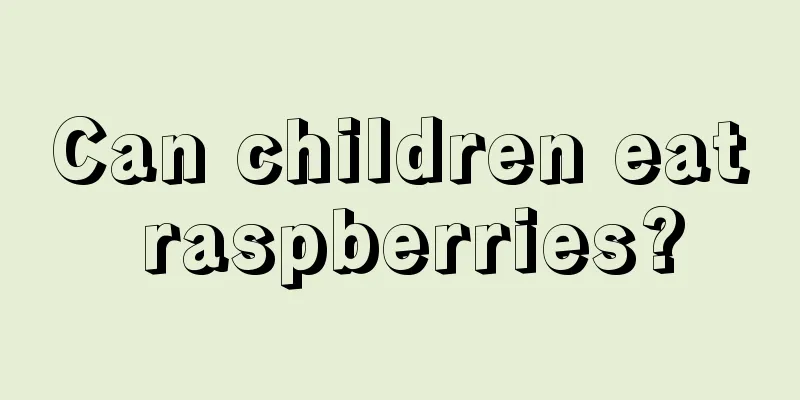Ten-month-old baby often has diarrhea

|
Every change in the baby after birth is watched by the mother. Because many new mothers do not understand the baby's growth and development very well, sometimes their judgment of the baby's physical condition is not very accurate. From birth to adulthood, every day is very difficult for babies, and mothers worry about their babies growing up healthily. It is common for babies to have diarrhea. Here, let’s tell mothers why ten-month-old babies often have diarrhea? 1. Causes of diarrhea in 10-month-old babies
1. Caused by viruses If your baby's diarrhea is confirmed to be caused by rotavirus, you can take some proecological preparations to regulate the gastrointestinal flora, such as Mommy Love, Bifidobacterium, Golden Bifidobacterium, etc. In addition, parents should give their children more water to avoid dehydration. 2. Bacterial infection Bacterial infectious diarrhea, like viral infectious diarrhea, is a common gastrointestinal disease in children. Common pathogens include Escherichia coli, Enterococcus, Salmonella, etc. Bacterial diarrhea may be treated with antibiotics, but parents should not use antibiotics on their children at will at home, because the use of antibiotics can easily lead to drug resistance. Doctors use antibiotics for children so accurately that they calculate the corresponding kilograms or even grams of body weight. 3. Non-infectious diarrhea The cause of non-infectious diarrhea is mostly gastrointestinal flora imbalance, which causes indigestion. The most common causes are improper feeding, hot weather, and sudden cold. How can parents tell the difference? Generally, children will have symptoms such as fever, vomiting, loss of appetite, and loose stools. At this time, adjusting the baby's diet can basically solve the problem through dietary conditioning. When recuperating, please pay attention to your children, drink plenty of water, and do not let them become dehydrated. In terms of diet, it is advisable to eat light, easily digestible food and less raw and cold food. If diarrhea persists for more than a week, you need to see a doctor. In the hospital, you should take medicine on time and have regular checkups as instructed by the doctor. 2. What should I do if my 10-month-old baby has diarrhea? 1. Replenish the body's lost water as soon as possible Many mothers rush to the hospital as soon as their baby has diarrhea. In fact, when babies first start to have diarrhea, they are usually mildly dehydrated. As long as it is under the guidance of a doctor, treatment can be carried out at home. This is timely and convenient, and can reduce a lot of unnecessary trouble, which is very beneficial to the baby's recovery. So, the first thing mommy needs to do is to determine whether the baby is mildly dehydrated. Babies with mild dehydration feel thirsty, have slightly dry lips, produce less urine than usual, and the urine is yellow in color. They also become irritable and cry easily. Mommy can choose from the following methods of rehydration: rehydration with homemade sugar and salt water, that is, add 1.75 grams of refined salt and 10 grams of white sugar to 5000 ml of warm boiled water, 1.75 grams of refined salt is equivalent to half of the beer bottle cap, 10 grams of white sugar is equivalent to 2 teaspoons; rehydration with homemade rice soup and salt liquid, that is, add 1.75 grams of refined salt to 500 ml of warm boiled water; rehydration with ORS (oral rehydration salt) prescribed by the doctor, ORS rehydration salt is a prepared dry powder, when using it, just mix it into liquid according to the instructions. Then, give 20-40 ml of fluid per kg of your baby's body weight during the first 4 hours. After that, take it orally at any time and drink as much as you can. Babies under 2 years old can be fed a small spoonful every 1-2 minutes, while older babies can drink from a small cup. If the baby vomits, wait 10 minutes before feeding him slowly again; once the baby's eyelids become swollen, it indicates that the fluid has been replenished excessively, and he should temporarily switch to drinking boiled water or breast milk. Kind reminder: Do not add ORS rehydration salts to milk, rice soup, juice or other beverages, and after preparing it according to the instructions, do not add sugar, otherwise it will affect the rehydration effect. 2. Give your baby rich food to prevent malnutrition Traditional treatment for diarrhea advocates that the child should fast for a period of time. However, this will hinder the body's nutritional supplementation and may easily lead to malnutrition. It is now recommended that babies with diarrhea should not be fasted, but they should follow the principle of small and frequent meals and eat at least 6 times a day. Breastfed babies continue to drink breast milk, but the mother's diet should be lower in fat, otherwise it will aggravate diarrhea; babies who are bottle-fed within 6 months can drink milk in normal amounts; babies over 6 months old who have already started weaning foods can eat some easily digestible foods, such as porridge, soft noodles, minced fish, a small amount of vegetable puree, fresh fruit juice or banana puree, until 2 weeks after the diarrhea stops. |
<<: Baby has diarrhea and low fever
>>: What should I do if my child poops in small amounts?
Recommend
What is the circumference of a three month old baby's head?
What is the head circumference of a three-month-o...
How to stop a baby's constant cough?
When mothers see their babies coughing, they shou...
What are the staple foods for babies?
We all know that babies are in the stage of physi...
Is your newborn breathing heavy? It is important to understand these
It is a very normal phenomenon for newborns to ha...
Bronchial asthma in children
When a child develops bronchial asthma, be sure t...
How to treat a child with a high fever of 39 degrees?
Many children have high fever problems, which ser...
Children's nasal discharge blood
There is nothing wrong with a runny nose, but if ...
What to do if your baby has a runny nose due to a cold
Are you still worried about your baby's runny...
Four month old baby coughing while sleeping
The baby's physical health is what parents ar...
What causes a child's heart rate to be too fast?
The heart is the most important organ in the huma...
The reason why eight-month-old babies have hard stools
Because the weather is very hot now, and eating s...
What to do if your child has itchy bottom
Don’t think that only adults will experience itch...
How to deal with toothache in children
Toothache is a relatively common problem. Especia...
What’s wrong with the child who is dazed and absent-minded?
Sometimes we get distracted in our daily lives, w...
Is a child's cough with echo a symptom of pneumonia?
Infants and young children are prone to pneumonia...









